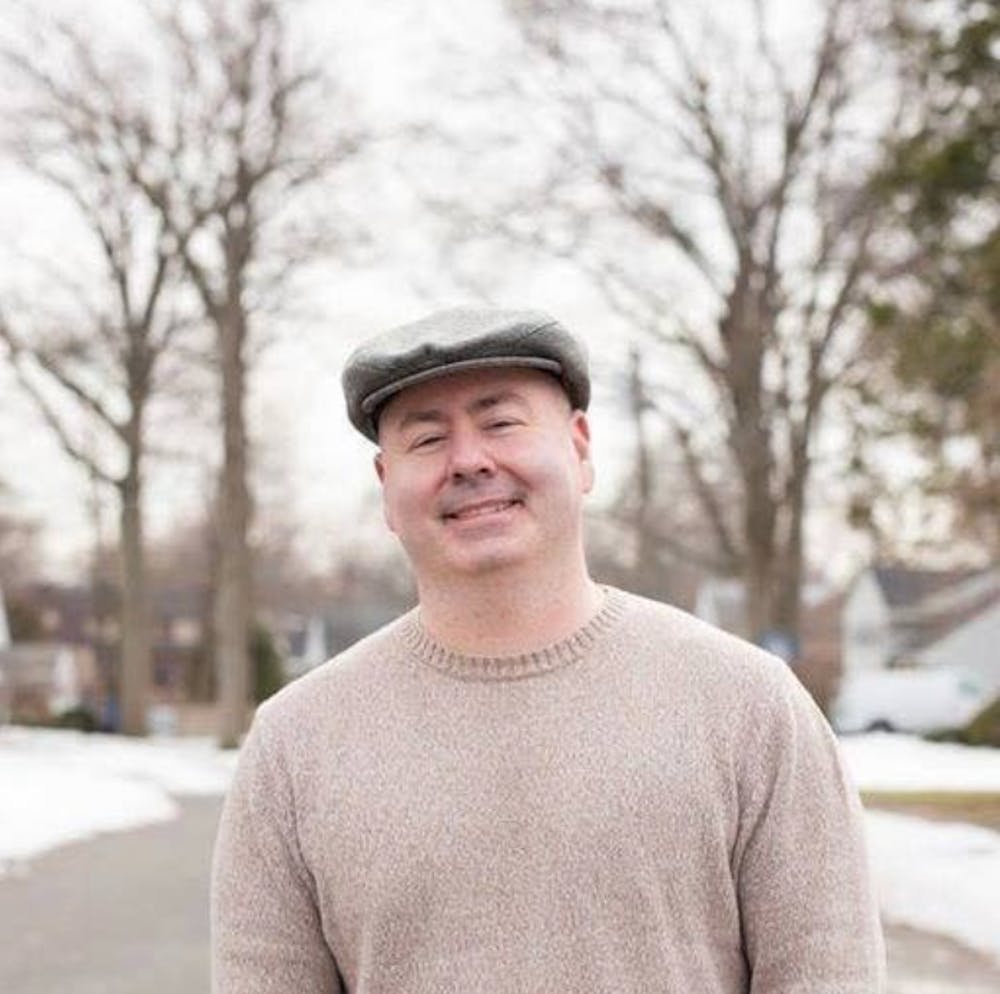By Richard Chachowski
Staff Writer
Combining music and psychology is no easy feat, but alumnus Dan Britt was able to do so with the creation of his A.I.D. program, an exercise meant to relieve mental stress through drumming.
As Britt describes it, the A.I.D. program, which stands for Affirmation-Incantation-Drumming, is designed to help release feelings of anxiety and unease by rhythmic physical movement.

“An affirmation is a positive statement we make about ourselves,” Britt writes on his website description of the A.I.D. program. “It could be a goal we want to achieve or a challenge we want to overcome. It could be small, or it could be life-changing such as quitting smoking or losing weight. When we turn the affirmation into a song or chant, it becomes an incantation and is more powerful.”
Britt’s strategy with the A.I.D. program is turning individuals’ affirmations into incantations, which becomes more meaningful when paired with physical movement, such as drumming.
A psychology graduate from the College, Britt has had a successful career as a musician, a drumming instructor and a writer. With the creation of the A.I.D. program, Britt found a way to combine his love for drumming, with his passion for psychology, in a mentally gratifying and beneficial way for individuals in need of relaxation.
The Signal spoke with Britt in a discussion about the A.I.D. program, the topic of both music and psychology, his time at the College, and advice he has for beginning musicians.
What interests you about both psychology and music?
BRITT: A lot of people who choose psychology as a major may be sensitive, empathetic types and/or want to learn about themselves and others. And that was the case for me as a teen. So, I was intrigued and wanted to learn about growing past challenges, and I did not like to see others experiencing mental or emotional anguish. So, I started reading books on my own from the bookstore, and then started taking psychology classes in college. The various theorists throughout eras and schools of thought are quite fascinating (e.g., Wundt, James, Pavlov, Skinner, Freud, Maslow, Rogers, Piaget, etc.).
I enjoyed the theory courses, along with the more science/math courses (i.e., Statistics, Research Methods), and then in my senior year, when I took a Humanistic Psychology class with one of the most interesting professors, Dr. Gorczynski, it was great. We got assigned some “out of the academic norm” type of books – a more abstract, spiritual approach. He got us reading some books by authors such as Marianne Williamson, Larry Dossey, Gary Zukav, and Jon Kabat-Zinn. So, in sum, I was intrigued by and enjoyed many aspects of the field.
As for music, when I was 10, I went to church in Cresskill, NJ, and there was a folk band with a drummer, and it was powerful, vibrant and fun. I was drawn to hearing and watching the drummer and started taking private lessons. Drums are fascinating in many ways, and with any given limb alone, there are numerous possible strokes, techniques, tempos, volumes, etc. And between the limbs, there are limitless coordination combinations to create. But even at the simple playing level, it’s a great outlet and it’s a powerful experience to perform music or solos for an audience. Also, drumming is physical and keeps people mostly in the here and now – the present moment, which is great for mood enhancement, stress relief and anxiety reduction.
Do you believe there are any psychological perks when it comes to drumming or playing music in general?
BRITT: Absolutely. First off, playing music in general is a positive, unifying, healing force. And there are a lot of articles that came out about the benefits of drumming. It is a safe, often organized expression of multiple energies. It keeps us mostly in the present moment, as opposed to any detrimental thinking of the past or worries of the future. The human brain is amazing, and the mind is capable of tens of thousands of thoughts per day, but some can be false, involuntary and create false associations. So, the very act of having gaps of thinking and awareness is therapeutic, and it can actually result in great ideas. A lot of great inventors, writers, artists and scientists came up with some brilliant concepts via internal spaciousness, possibly alternated by a period of productivity or a flurry of ideas.
Where did the idea to combine both drumming and “affirmation-incantations” in the A.I.D. program come from?
BRITT: Affirmations are commonly written about in books and articles. I was listening to Tony Robbins CDs years ago, and he was teaching incantations, which could be more of a chant of a positive statement accompanied by a steady tempo of physical movement such as with the fingers touching and/or walking. So, that’s rhythm and drummer-based! So, I thought, we could apply the physical movement in stroke (staccato strike of the stick) or buzz (relaxed multi-bounce of the stick) form to a drum pad.
What was the reasoning behind why the A.I.D. program was created?
BRITT: Stress is such a major detriment to many and with recent deep political division along with the unexpectedness of the pandemic, it in some ways got compounded. It also kept people at home looking for new things to do. So, the relaxing affirmations and/or incantations would induce a therapeutic meditation in a fun, soft physical way. And if their focus is goal attainment, motivation or confidence, then a more intense incantation chant with more authoritative strokes would assist for that pursuit.
I have had a great health coach, Nicole, from Vida Health for a few months now and it opened me up to a new perspective with a focus on nature, meditation, being in the moment, deep breathing and much more. So this experience was also conducive to developing this program.
Can lesser experienced or even completely inexperienced drummers use the A.I.D. program, or is it designed for somewhat more experienced drummers?
BRITT: Any person can do it. No experience is necessary. In fact, the simpler the strokes and rhythms are, the better it can work. I didn’t want any complexity involved as it would counter the goal of the program.
Has your career as a music instructor influenced you in any way?
BRITT: Yes. Having taught so many beginning drum students led to me having to break exercises down to simpler, smaller steps and learning that there were some common, specific challenges. And so that influenced my approach with both books.
How has your time at the College impacted you or your career?
BRITT: I cherish my time, professors and studies at TCNJ. It was an honor to be there. As a psychology major and philosophy minor, I wrote so many papers, which helped with my later writing, whether it be for marketing, a book, settling a financial dispute or reaching out to people; and the professors at TCNJ are world-class, and they opened my mind up in so many ways.
What advice would you give to a drummer or musician first starting off?
BRITT: Have fun with it. And the type of energy you have and emit to the audience is important. If you’re having fun, they’re having fun. Take learning one step at a time. If you’re feeling confused or really challenged in the initial lessons, that could change in the future or when you’re in a different situation or a little older. Repetition of accuracy is key. There’s no rush. Power and speed come in time as a result of repeated accuracy.
Do you have any advice for a musician looking to make it professionally?
BRITT: Network. Connect. Find a positive well-rounded mentor who does what you want to do. Learn many skills. Understand that doing things you love is not always financially easy, so business and communication skills are also important. Try to be a forward thinker in terms of technology and such – attempt to perceive “where the puck is going,” so you can possibly get in and get established early in something new. And you may work some other jobs to supplement income or to be the main income.
If you’re a humble, easygoing and flexible person, people will want you around more and you’ll have more opportunities. Try to keep fit (or somewhat fit) via exercise, more veggies, water, etc. Reach out to someone you admire and compliment them. Maybe even offer to help them with something they may not be good at, such as technology, computers, a website, PR, social media, graphics, etc. I did this a lot when I was younger, and I enjoyed it, because you get to work with someone you look up to, learn a lot, be in a position of great networking and opportunity, and everybody wins.
If you are working on a book or a project, you can team up with people who have complimentary skills and strengths – I did this as well. Nobody does it alone. Also, there is a lot of uncertainty and change. I am very used to it now especially being more of a free-spirit type, but if you want more structure and security, teaching music in a school is great for that.
For information on the A.I.D. program, visit Dan Britt’s website, http://www.dannybritt.com/







